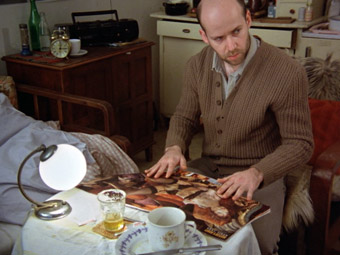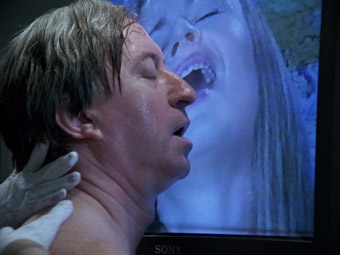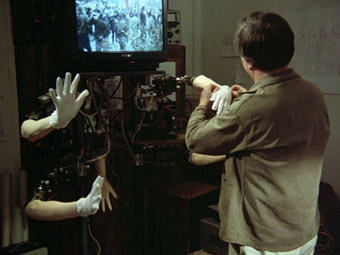|
Jan Švankmajer, cinema's only remaining heir to the alchemist throne of Méliès, has been making films since 1964 (his debut short, The Last Trick, exhibited an early predilection for the duality of mechanics and nature; that which is manufactured and that which is cultivated; that which is made of cloth or cogs, stimulated by the yanking of rope or turning of a screw, juxtaposed against scuttling insects, plants and limbs (whether they be attached to any living source is wholly irrelevant)), but my first experience with him came at 2010's London Film Festival, at a packed-out show of Surviving Life. My first impression was one of befuddlement, but later, long after the screening, the film's bits and bobs began falling into place, and the grains of my obsession with this curious Czech auteur were sown. 1988's Alice, restored last year by the BFI for a brand new Blu-Ray release, was the film which really keyed me into his aesthetic and intellectual style, and is one of several works which adapts and warps a popular fairytale and/or folk story. For Švankmajer, whose background lies in puppetry and masks, and the silent productions of Prague's Magika Lanterna theatre, film is about realising dreams and emotions, and his cinema rejects the school of thought which states that all art must educate or reflect, or depict in pornographic detail the grime and misery of day-to-day life; these films he describes as being about the "smell of humanity."

Across his extensive back-catalogue, Švankmajer has explored themes of desire, repetition, depravity and sexuality, which arguably arrive at the same idea: identity. His films are often grotesque and exaggerated, surreal and nightmarish (just check out 2005's Lunacy, due for review soon), but what really captivates about them is his attention to detail. In 1966's Punch and Judy, Švankmajer tinkers with an Eisenstein-like editing rhythm, wielding the cut like building blocks toward his ultimate vision of a childhood nightmare. It's an incredible mélange of form and content, a film constructed of carvings and sprockets, seventy-year-old engravings on hundred-year-old wood, fissures in stone and rips in fabric. The smallest of details scurry past the viewer at incomprehensible speeds, and yet somehow they all register. Consider also the intricacy of 1965's A Game With Stones, an allegory for evolution which observes five sequences of stones arranging and re-arranging themselves in increasingly complex patterns, building from simple colour-coded juxtapositions into ornate humanoid structures with organs and limbs; the fourth and fifth sequences revolving around reproduction and destruction, respectively. Across every stage, Švankmajer's ultimate interest lies with texture and form - not so much the collision of objects, but the nature of their remains. This is also the perfect description for Conspirators of Pleasure, an astonishing exploration of the conflict between Freud's pleasure and reality principles, wrestling for control in the everyday. It should seem apt that Švankmajer has dedicated an entire feature to the idea of duality, but equally so that he explores the theme under the guise of, in his own words, a "grotesque black comedy."
"Our hands are our most communicative organs of touch" says Švankmajer in the press notes, "though by no means the most sensitive, emotive or arousing." Indeed. Conspirators of Pleasure is about the way we perceive pleasure with our entire being, locating gratification through rolling pins, umbrellas, fur, cardboard, bread and candles (this will all make sense soon, I promise). It's a film of very private deviancy, and the fetishes we allow ourselves to indulge when (seemingly) nobody is watching. Mr. Pivonka (Petr Meissel) fixates over his plump, bug-eyed neighbour, Mrs. Loubalová (Gabriela Wilhelmová), and builds a life-size effigy of her for ritualistic sacrifice. The local newsagent Mr. Kula (Jirí Lábus), who is surrounded by pornography all day long, constructs a machine to masturbate him while he watches the beautiful newsreader Mrs. Beltinska (Anna Wetlinská) on TV. She's married to a police captain (Pavel Nový) obsessed with the sensation of home-engineered pleasure toys (tipped with bristles and pins and feathers) on his skin. Finally there's the postwoman Mrs. Malková (Barbora Hrzánová), who excavates loaves of bread and rolls its dough into little balls, which she then ingests though her nose and ears. (Note: I've not forgotten to disclose Mrs. Beltinska's fantasy, but would rather keep one a secret; let's just say that for those who saw Uncle Boonmee Who Can Recall His Past Lives, the parallels might be surprising.)

Thematically, Conspirators of Pleasure sits comfortably alongside 1992's Food, where Švankmajer explored humankind's consumptive nature, suggesting that we allow our bodies to be abused so long as they can be fulfilled; in the film's first segment, Breakfast, patrons of a grungy café feast upon meals dispensed by previous diners, who transform into vendors after consuming their own plate of bread, sausage and mustard (once again we can spot the duality of mechanics and flesh). Here, food becomes eroticism, consumption becomes climax, and the nature of addiction is laid bare for satirization (although it should be noted that Švankmajer never mocks or passes judgement on his characters). Ultimately, the film is a portrait of cycles of soulless sexual fulfilment from which the victims are unable to escape. Švankmajer conjures a dark, melancholic air around his characters, often employing close-ups on eyes to compensate for the lack of dialogue (intermittent muttering on the TV aside, nobody in Conspirators of Pleasure ever speaks). This atmosphere, largely developed through diegetic sound and editing, is what lends the film such emotional resonance – we recognise these lives and their feelings, even if we can't relate to the specifics of their fantasies (I can't speak for you, but certainly I've never felt the need to travel to a desolate, decrepit church and whip a straw boy).
I've probably made the film sound like some deeply outré, cirque du S&M forebear to Shame (both feature full-frontal male nudity, here from a puppet), but it's not depressing in the slightest, and Švankmajer actually mines much humour and beauty from the admittedly bleak scenario. Early in the film, Mr. Pivonka sets fire to a sheet of paper, but instead of burning away into embers it crisps and curls like a blackened orchid, and for a short while the camera just lingers over its form, admiring the destruction. Many, if not all of Švankmajer's films fixate upon the texture and consistency of objects and surfaces, and Conspirators of Pleasure is the ne plus ultra of this aesthetic and thematic obsession. Obviously there is the duality of mechanics and flesh, best exemplified by Mr. Kula, who displays no shame in exhibiting pornographic magazines at the front of his newsstand, but anxiously conceals any trace of the circuits and switchboards which he tinkers away at between customers; the bits and bobs which will animate the masturbation machine lying dormant in the back room. But it's also true that each character is trapped by routine, forced by their 'addiction' to work towards that act of self-gratification, and so much of their behaviour could be read as cognitive and mechanised - although building toward an ultimate pleasuring of the flesh.

If the auteur theory applies to anyone, it's Švankmajer, but Conspirators of Pleasure also stands on its own as an absorbing and oddly sensual work of art. There's no dialogue in the film, and little in the way of a score until its neatly cross-cut finale, instead emphasizing the natural, diegetic sounds which make up these character's lives; here, each pluck of a feather from a chicken's breast booms like the closing throttle of orchestral noise in Lars von Trier's Melancholia. Every sound is pored over and amplified, ushering a more immediate emotional response from the viewer – even the creaks and groans which arise from decaying floorboards have significance, and the sound of Mrs. Malková licking her fingers before digging them into the cavernous half-loaf becomes oddly erotic. Conspirators of Pleasure is an absolute masterclass in atmosphere, and we are drawn into the worlds of its characters by suggestion rather than exposition – Mr. Pivonka seems a meek and spindly man, but dual ideas of masculinity adorn his walls; on one side, Jean-Claude Van Damme, on the other, James Dean. This might call into question his sexuality, and the purpose of Mrs. Loubalová's sacrifice is rendered more enigmatic, but the viewer is left to discern whatever they like about these characters through Švankmajer's perfectly composed peephole.
Every gloopy squelch and exhumed gasp in Conspirators of Pleasure carries importance, and the performances – which owe more to the silent tradition of, say, Harold Lloyd – are all exceptional. Meissel runs the full gamut of anxiety, shame and excitement as Mr. Pivonka, wiping beads of sweat from his brow as his eyes dance with pleasure. Equally compelling is Pavel Nový's police captain, fashioned as the typical male archetype, furrowed and gravely, but the scenes of his indulgence, as he rubs and caresses himself with household objects, is captivating, and among the best displays of released pleasure that the screen has ever witnessed (albeit an incredibly odd one). Švankmajer's slippery narrative thread finds time to accommodate all of these characters, and although Pivonka and Loubalová are clearly his leads, none of the surrounding conspirators are short changed, or feel any less developed. What's astonishing about the film is that these characters come to feel so real, and we come to care for them so much. Its director may describe Conspirators of Pleasure as "a grotesque black comedy" – and at times it's riotous – but what we shouldn't ignore is its humanity, and its willingness to explore the darker side of our nature with not prejudice or disgust, but something approaching love. That, among many, many other qualities, is the genius of Švankmajer.
One of three Švankmajer features being released on UK DVD by New Wave that appear to have been licensed from Czech production company Athanor (their logo is at the front of both the disc and the film, and you can choose between Czech and English menus), this is a first-class transfer in every respect, boasting a strong level of detail, largely naturalistic colour, little sign of film grain and perfectly balanced contrast. The picture is also spotless, with not a trace of dust or damage. An object lesson in how to restore a film for DVD.

The Dolby 2.0 stereo track is lively and clear and services the music and the sound effects well. Stereo separation on the effects in particularly is often very distinct.
Disappointingly slim, boasting only the original poster and a stills gallery. I wish I could write more, but there's just nothing here – luckily the film is good enough to warrant paying full price.
Švankmajer's beautiful dark twisted fantasy, although oft ignored in his canon, is entirely emblematic of the thematic and aesthetic ideas which have preoccupied his work since The Last Trick, and its exploration of them is endlessly fascinating. The combination of sound, performance and editing build to a truly sensual, disturbing picture, but for the easily disturbed/squeamish, this ain't no Taxidermia, but you certainly won't want to digest it on a full stomach. Highly recommended, albeit with caveats.
|